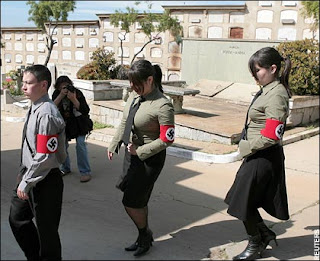RACE AND CLASS IN CHILE
Don't worry, haven't given up, just being a lazy bum.
Actually, I'm doing a lot of wandering around and swotting up on the King's Cross / St Pancras International development at the moment, so expect a post or two on this soon. The area just north of KX is among the strangest places one can wander (fairly) freely in at the moment: a place destined for commercial development, but desperately clinging onto its few remaining tenements, granaries and gasholders.
For now, a link to a short PBS film entitled "The new nazis: Hitler's unlikely followers." It follows Cesar, a young Chilean Nazi who is unusual for the colour of his skin - he is a dark-skinned, indigenous Indian Chilean. Why would Cesar look to the Third Reich for ideas for how to change the world? Because the rise of Naziism in Chile is only nominally about race. Fundamentally, it is about class.

Chile was the first nation in the world to fully apply a neoliberal economic policy. When Augusto Pinochet established total control of Chile a couple of years after Salvador Allende was deposed in 1973, he invited a group of young Chilean economists nicknamed the "Chicago Boys" to neoliberalise Chile's economy. All natural resources other than copper were privatised, there were no limits to repatriation of profits outside of Chile, free trade was established, and anything which impeded the accumulation of capital - unions, state intervention, national ownership - were dealt with harshly.
Neoliberalism jump-started the Chilean economy until a slowdown in the early 1980s, but fundamentally it had the same effect as similar policies in Britain and the US from the 80s onwards, in China from the late 80s onwards, in Russia and Mexico from the early 90s onwards and (we can predict) in Iraq currently: a massive accumulation of wealth for the richest in the country, and a diversion of national income away from the poor. As a result of neoliberalism, Chile is the second most unequal country in the continent after Brazil.
This explains why Cesar's search for scapegoats is about class rather than race. This massive accumulation and concentration of capital has been accompanied by class conflict (one could say that they are one and the same thing). The top 1% of Chileans have only increased their wealth through the dispossession of those they exploit. Working-class kids like Cesar, whatever the colour of their skin, can see extraordinary wealth every day of their lives (in Latin American cities, wealth sits brazenly and openly alongside poverty), but they cannot grasp it.
They cannot confront those who accumulate at their expense, because as well as being antagonistic towards them, they are also dependent upon them. Being under-paid is, after all, better than not being paid at all. And so, powerless to confront the real cause of their poverty, people like Cesar turn to easier scapegoats: immigrants, left-wingers, degenerates. It might be most palpable in Chile, but it's a pattern we can see all over the world, including at home.

1 Comments:
Negro envidioso
Post a Comment
<< Home